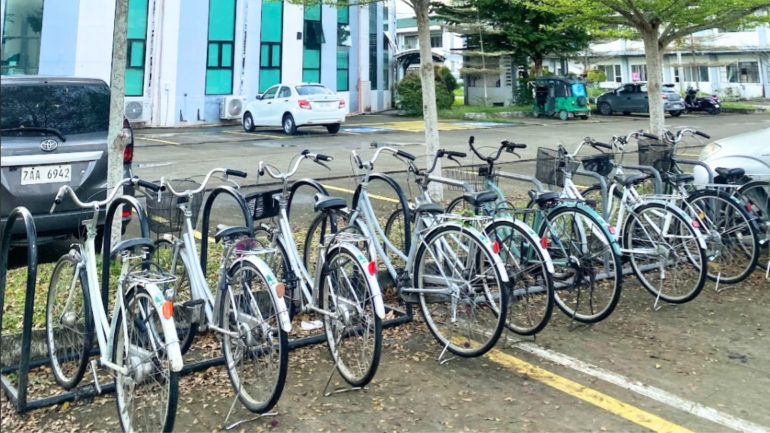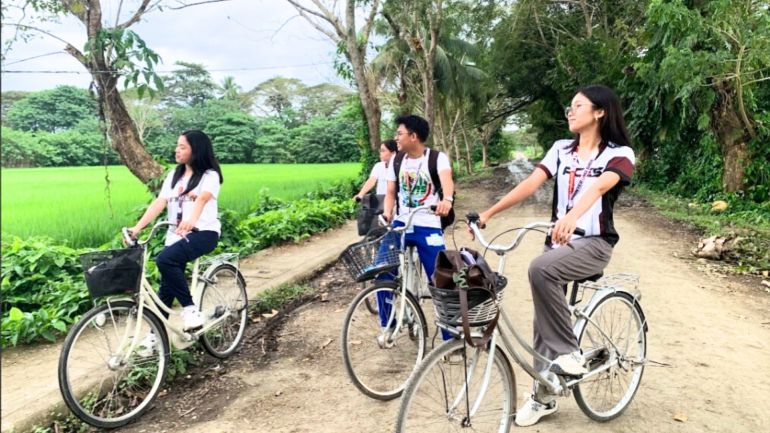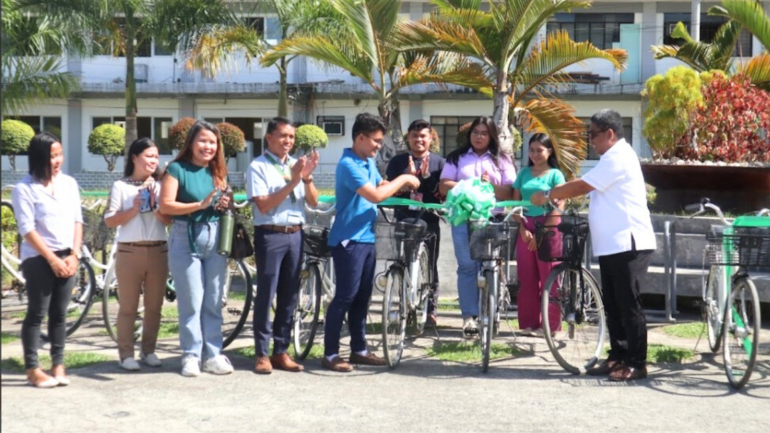Young Filipino promotes bike as a means of transportation to reduce carbon emissions

The Philippine transport sector’s greenhouse gas emissions reached about 37 million tons of carbon dioxide equivalent (CO₂e) in 2023, higher by 4 percent from the previous year, according to statista. Massive amounts of carbon dioxide in the atmosphere trigger climate change and global warming.
Prompted by the increasing carbon emissions, Sheen Ochavo, a 23-year-old, launched in 2023 the PadyaKalikasan: Pedal for the Environment project in Bayugan, a city in the province of Agusan del Sur, more than 1,000 kilometers southeast of Manila.
The PadyaKalikasan promotes the bike as a means of transportation to reduce carbon emissions and seeks to help educate people on the benefits of bike use on the environment and well-being. In 2024, it expanded to the neighboring province of Agusan del Norte.
To encourage biking, the PadyaKalikasan, a portmanteau blending biking and the environment, put up end-of-trip facilities, like bike racks and a repair station at the Caraga State University and Bayugan City.
In 2023, the PadyaKalikasan launched its bike-sharing project at the Caraga State University as part of its campaign to reduce carbon emissions.
“Students and teachers can use the bikes,” Sheen said. “However, the majority of users are students. We have a website where students can check bike availability. We can also track the location of the bikes using the GPS.”
Some students at Caraga State University use bikes to move between classrooms since some classrooms are a distance apart, and students have to ride a tricycle to attend classes.
Currently, students can rent a bike for Pesos 5 per hour for the purpose of maintaining their units. The bike rental fee is half of the one-way Pesos 10 minimum fare for tricycles. By using the bike to move around the school, the students can save money on transportation.
Aside from moving between classrooms, the students can also use the bikes for other purposes, like leisure biking or biking as exercise.
An average of 20 people use the bikes at the university in a day. When the weather is fine, the number of users can exceed 20.
The bike-sharing program at the Caraga State University has 10 units of bikes at present. Sheen is looking at increasing the number of bikes this year to 20-30.
“The school is big,” Sheen said. “We plan to increase the units so that more students can move around the campus on bikes. We will encourage the alumni of the school to increase the number of bikes.”
People can support the bike-sharing project by donating bikes.
The PadyaKalikasan also collaborates with the local government on its drive to help cut down carbon emissions and encourage the use of bikes as a means of transportation. It proposes to the local government to provide bike lanes for the bikers for their safety on the road.
According to Sheen, more than 1,000 people use bikes in Butuan, but the city currently has no bike lanes.
He believes that when the local government provides bike lanes, more people will be encouraged to use bikes.
“The local government should give priority to people who use bikes to keep them safe on the road by providing them with bike lanes,” he said.
2024 data shows that Butuan City has more than 1,900 bike users. This number translates to Pesos 583 estimated health cost savings per kilometer, 0.18 potential metric tons of carbon emissions avoided per kilometer, Pesos 5,206 potential fuel cost savings per kilometer of avoided car costs, and Pesos 2,496 potential fuel cost savings per kilometer of avoided motorcycle costs.
“People who use bikes contribute to reducing carbon emissions,” Sheen said. “If the number of people using bikes increases, carbon emissions will be further reduced." Our target is to lessen carbon emissions. We have noticed that it’s possible during the pandemic. So, it is doable.”
Sheen has taped the Creators of Hope, a project of the Jesuits under the Reconciliation with Creation network, for support in his advocacy to mitigate carbon emissions through the use of bikes as a means of transportation. The creators of Hope, in response, offered him assistance that he could use to empower the project more.
“We advocate eco-friendly mobility,” he said. “We are encouraging the students, the people, and the community to use bikes; that’s why we are providing bike facilities, like bike racks.”
The project seeks not only to conserve and safeguard the environment but also to promote the well-being of people.
“There is an option for us that we can change our habits, especially on transportation by simply using bikes,” Sheen said. “It’s not only for the environment but also for the people themselves because it’s a safe and sustainable means of transportation. Biking is also beneficial for our health. Thus, you do a favor not only for the environment but also for yourself."











